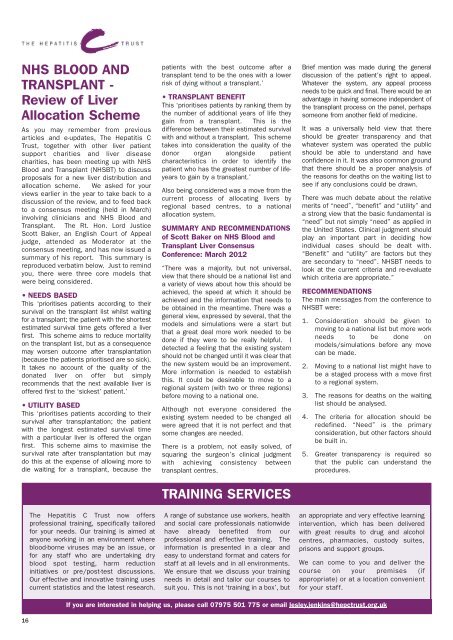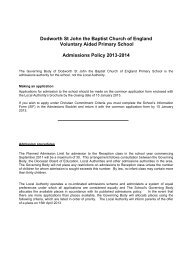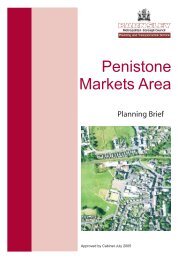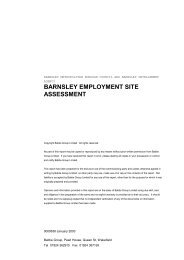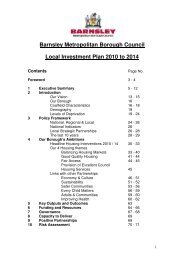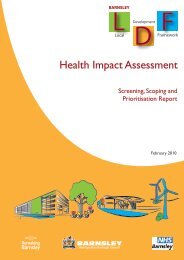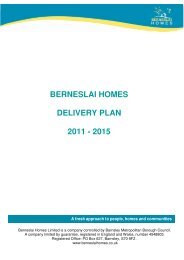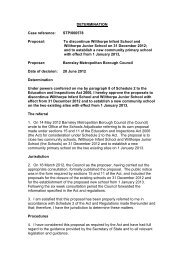IN THIS ISSUE… - Barnsley Council Online
IN THIS ISSUE… - Barnsley Council Online
IN THIS ISSUE… - Barnsley Council Online
Create successful ePaper yourself
Turn your PDF publications into a flip-book with our unique Google optimized e-Paper software.
NHS BLOOD ANDTRANSPLANT -Review of LiverAllocation SchemeAs you may remember from previousarticles and e-updates, The Hepatitis CTrust, together with other liver patientsupport charities and liver diseasecharities, has been meeting up with NHSBlood and Transplant (NHSBT) to discussproposals for a new liver distribution andallocation scheme. We asked for yourviews earlier in the year to take back to adiscussion of the review, and to feed backto a consensus meeting (held in March)involving clinicians and NHS Blood andTransplant. The Rt. Hon. Lord JusticeScott Baker, an English Court of Appealjudge, attended as Moderator at theconsensus meeting, and has now issued asummary of his report. This summary isreproduced verbatim below. Just to remindyou, there were three core models thatwere being considered.• NEEDS BASEDThis ‘prioritises patients according to theirsurvival on the transplant list whilst waitingfor a transplant; the patient with the shortestestimated survival time gets offered a liverfirst. This scheme aims to reduce mortalityon the transplant list, but as a consequencemay worsen outcome after transplantation(because the patients prioritised are so sick).It takes no account of the quality of thedonated liver on offer but simplyrecommends that the next available liver isoffered first to the ‘sickest’ patient.’• UTILITY BASEDThis ‘prioritises patients according to theirsurvival after transplantation; the patientwith the longest estimated survival timewith a particular liver is offered the organfirst. This scheme aims to maximise thesurvival rate after transplantation but maydo this at the expense of allowing more todie waiting for a transplant, because theThe Hepatitis C Trust now offersprofessional training, specifically tailoredfor your needs. Our training is aimed atanyone working in an environment whereblood-borne viruses may be an issue, orfor any staff who are undertaking dryblood spot testing, harm reductioninitiatives or pre/post-test discussions.Our effective and innovative training usescurrent statistics and the latest research.patients with the best outcome after atransplant tend to be the ones with a lowerrisk of dying without a transplant.’• TRANSPLANT BENEFITThis ‘prioritises patients by ranking them bythe number of additional years of life theygain from a transplant. This is thedifference between their estimated survivalwith and without a transplant. This schemetakes into consideration the quality of thedonor organ alongside patientcharacteristics in order to identify thepatient who has the greatest number of lifeyearsto gain by a transplant.’Also being considered was a move from thecurrent process of allocating livers byregional based centres, to a nationalallocation system.SUMMARY AND RECOMMENDATIONSof Scott Baker on NHS Blood andTransplant Liver ConsensusConference: March 2012“There was a majority, but not universal,view that there should be a national list anda variety of views about how this should beachieved, the speed at which it should beachieved and the information that needs tobe obtained in the meantime. There was ageneral view, expressed by several, that themodels and simulations were a start butthat a great deal more work needed to bedone if they were to be really helpful. Idetected a feeling that the existing systemshould not be changed until it was clear thatthe new system would be an improvement.More information is needed to establishthis. It could be desirable to move to aregional system (with two or three regions)before moving to a national one.Although not everyone considered theexisting system needed to be changed allwere agreed that it is not perfect and thatsome changes are needed.There is a problem, not easily solved, ofsquaring the surgeon’s clinical judgmentwith achieving consistency betweentransplant centres.TRA<strong>IN</strong><strong>IN</strong>G SERVICESA range of substance use workers, healthand social care professionals nationwidehave already benefited from ourprofessional and effective training. Theinformation is presented in a clear andeasy to understand format and caters forstaff at all levels and in all environments.We ensure that we discuss your trainingneeds in detail and tailor our courses tosuit you. This is not ‘training in a box’, butBrief mention was made during the generaldiscussion of the patient’s right to appeal.Whatever the system, any appeal processneeds to be quick and final. There would be anadvantage in having someone independent ofthe transplant process on the panel, perhapssomeone from another field of medicine.It was a universally held view that thereshould be greater transparency and thatwhatever system was operated the publicshould be able to understand and haveconfidence in it. It was also common groundthat there should be a proper analysis ofthe reasons for deaths on the waiting list tosee if any conclusions could be drawn.There was much debate about the relativemerits of “need”, “benefit” and “utility” anda strong view that the basic fundamental is“need” but not simply “need” as applied inthe United States. Clinical judgment shouldplay an important part in deciding howindividual cases should be dealt with.“Benefit” and “utility” are factors but theyare secondary to “need”. NHSBT needs tolook at the current criteria and re-evaluatewhich criteria are appropriate.”RECOMMENDATIONSThe main messages from the conference toNHSBT were:1. Consideration should be given tomoving to a national list but more workneeds to be done onmodels/simulations before any movecan be made.2. Moving to a national list might have tobe a staged process with a move firstto a regional system.3. The reasons for deaths on the waitinglist should be analysed.4. The criteria for allocation should beredefined. “Need” is the primaryconsideration, but other factors shouldbe built in.5. Greater transparency is required sothat the public can understand theprocedures.an appropriate and very effective learningintervention, which has been deliveredwith great results to drug and alcoholcentres, pharmacies, custody suites,prisons and support groups.We can come to you and deliver thecourse on your premises (ifappropriate) or at a location convenientfor your staff.If you are interested in helping us, please call 07975 501 775 or email lesley.jenkins@hepctrust.org.uk16


